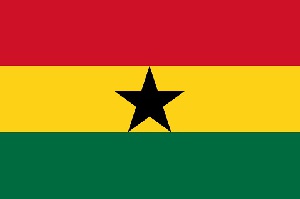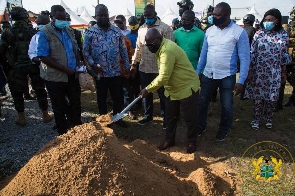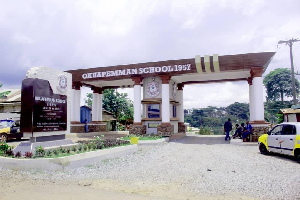Opinions of Friday, 22 September 2017
Columnist: Derbie Raphael
The historical antecedent of Ghana and the brain behind it
The country christened Ghana today is formerly known as Gold Coast, is today a Republican Sovereign State. Through the fiat and instrumentality of Dr Kwame Nkrumah, this country won independence on 6th March,1957.
The country is boarded by three different countries. Thus Burkina Faso to the North, Togo to the East and Côte d'Ivoire to the West. One may ask what about the Southern part? The whole of the southern part of the coast-line of Ghana is the Atlantic Ocean.
The pathological anatomy of Ghana is the aggregate summation of former Gold Coast colony including the Ashanti Kingdom and that of the elsewhile Northern Territories.
Our learned scholars of which Prof. Kofi N. Awoonor and the late Albert Adu Boahen are no exception state that the Portuguese were the first Europeans to have formally established a contact with the Gold coast. The first Europeans Settlement called Elmina was established by them. Their decision to build the second European settlement was taken from them by the Dutch and by 1663, the English finally captured it also from the Dutch and renamed Cabo Corso meaning Cape Coast Castle.
About the genesis of politics in Ghana, it is pertinent to reiterate that before Ghana became a Republic under the able leadership of Dr Kwame Nkrumah and his CPP, on the 1st July,1960, there had been many political formations, political riots and banditry in the country. Between 1947 and 1959, there were the formations of the following political parties and commission of enquiries.
1. The United Gold Coast Convention
2. The Convention People Party
3. The National Liberation Movement
4. The Northern People Party
5. The Ghana Congress Party
6. The Togoland Congress
7. The Muslim Youth Congress
8. The Muslim Association Party.
It is prudent to establish that, as matter of political pathology, all these political formations metamorphosed either from the Aborigines Rights Protection Society of Jacob William Sey(1897), or the National Congress of British West Africa of Casely Hayford(1930), as well as that of the Committee on Youth Organization of Dr Kwame Nkrumah of 15th May,1949 and of course the UGCC of Paa Grant (1947). This therefore leave no doubt that the collectivism of the above pioneers could be deemed to be the primary source of the Doyenage of our National Politics.
It is clear for us to comfortably ascertain that the UGCC, as a matter of political symbiosis, was a political zygote of Jacob William Sey's Aborigines Rights Protection Society of 1897, of George Alfred Grant alias Paa Grant, was a member.
It is intriguing to state, hitherto the above analogy, that Paa Grant was the brain behind the above synthesis of a political formation, on 4th August,1947, at Sekondi with De Graft Johnson, as his acting General Secretary. The UGCC was successfully launched with the following as members: Francis Awoonor-Williams, Ako Adjei, R.S Blays, Dr.J.B Danquah, William Ofori-Atta, Akuffo Addo and Obetsebi Lamptey.
I believe am making sense? In fact, the issues am raising are historical facts that can never be contested.
Osagyefo Dr Kwame Nkrumah, the gallant, vociferous and brilliantly enlighten and visionary man whose birthday we are celebrating today, is characteristically characterized by an unmatchable, indescribably immeasurable intellectual sagacity. It is indeed a global fact that Dr Kwame Nkrumah was an icon and an epitome to all African countries including part of the Western world. No wonder he is still in the memory of multitude of people despite his long physical departure on earth.
By 5th December, 1947, this great man was invited home from abroad to take up the mantle of a substantive General Secretary of the then newly-born political baby christened as UGCC. He was invited through the recommendation of Dr Adjei to Paa Grant and the central committee of the UGCC. He was to operate from his headquarters at Saltpond.
One may ask, who is Osagyefo Dr Kwame Nkrumah? This is the man born on 21 September,1909 at Nkronful in the Western region of Ghana. This is the man who permeated and defied all odds to bring the name Ghana to our preserved country. Am talking about the man won an election while in jail. Just as you know, alphabetical construction is not enough to describe this. Dr Kwame Nkrumah is the man set enviable records in the world as far as independence and development is concerned. His monumental contributions are appreciated lauded by all and sundry across the length and breadth of the world.
The political riots that led to the shooting of the ex-servicemen at Nii Bonne III (Alata) of Osu-Accra by the Chief Supt.C.H. Imry on 5th February, 1948 is one of the historical incidents that is remembered every year.
This incident is labeled by the politicians as The Christianborg Crossroads Massacre of Supt. C.H Imry in the political annals of Ghana. Ladies and gentlemen, it will interest you to note that though Nkrumah was not at the scene of the the above episode, he was arrested together with some comrades of his in the struggle. The famous big six were the people arrested.
In order to get a clear manifestation of the episode, a commission of enquiries was quickly instituted by the colonial administration and the outcome favourably recommended that a new constitution be drafted for Gold Coast.
Surprisingly enough, whilst Nkrumah was under investigation in Accra, his compatriots and comrades in the struggle, secretly left Accra for Saltpond where the General Secretary's office is situated. They ransacked the office and found some official correspondences which bore the word, "COMRADE". This was interpreted to mean that "Dr Kwame Nkrumah was a Communist". This finally led to the accusation of Dr Kwame Nkrumah as being the founder of the Ghana National College at Cape Coast for students who were summarily dismissed from schools and colleges within the area for solidarising with the big six.
Dr. Kwame Nkrumah, having taken appointment as General Secretary within the ranks of the UGCC, could not withstand the machinations stereotyping and " feet-drugging" of his senior partners in the UGCC.
Being a brilliant and an intelligent man, Nkrumah honourably resigned his post. This resulted in the formation of a new political party under his own leadership. This new political party was christened as CPP and launched at Western Sports Arena in Accra on 12th June, 1949 with the slogan, Self government now!
It is interestingly interesting to note that many of the card bearing members of the UGCC crisscrossed carpet and comradely joined the CPP. This resulted in the creation of political hiatus in the UGCC.
I guessed you are tired reading through this long historical piece of writing. Sorry for any inconveniences but remember the tittle of this piece. It suggest to take you down the lane of history. I shall come to the end of it now. I write to erase the erroneous believe in some people who think that Nkrumah doesn't deserve to be celebrated alone for the indelible blue prints he left in the world.
In the 1951 general elections, the Coussey Committee recommendations to the government, general elections were held on 9th February, 1951 to elect only 75 members to the proposed Legislative Assembly under the 1950 constitution.
Comrades, it was astonishing and amazing of the colonial bureaucracy, the CPP won an overwhelming victory with Dr. Kwame Nkrumah as its leader. While still held prisoner at the Ussher fort James Town, Accra, Kwame Nkrumah won 20,780 votes on the ticket of the CPP. Below were the elections results: 1. Dr. Kwame Nkrumah (Politician and Journalist) 20,780
2. Thomas Hutton-Mills (Legal Practitioner) CPP 19,312
3. Lamptey Emmanuel Odarquaye Obetsebi, (Barrister at Law) UGCC 1,630
4. Ako Adjei (Barrister at Law and Journalist) 1,451
On 12th February, 1951 Nkrumah was immediately released from prison and advised to form a government. Suffice it to add that, Nkrumah who was the leader of government business in Parliament was finally confirmed as prime minister on 5th Match,1952. And by October, 1952, he had already solicited with the colonial government through the conscience of Chiefs and civil servants for further constitutional changes. The traditional constitution of 1954 was preceded by another general election in June 1954. Dr. Kwame Nkrumah's CPP won convincingly with a majority of 72 seats out of 104 seats in Parliament.
Ladies and gentlemen, with the reconfirmation of Dr Kwame Nkrumah and his CPP as the people choice, the Secretary of State for the colonies, on September 18 1956, optimistically announced a firm date for Gold Coast Independence. It was decidedly decided that the 6th March,1957 should be the official date for Gold Coast independence. And that the new Nation should be known from the aforementioned date as Ghana.
Truly truly indeed, on the 6th Match, 1957, Osagyefo Dr Kwame Nkrumah had announced to the whole world that "The independence of Ghana is meaningless unless it is linked with the total Liberation of Africa".













